Disclaimer: The information provided in this article about resentment, stress, anger, and mental health is for informational purposes only and is not intended to replace professional medical advice, diagnosis, or treatment. Always seek the advice of a qualified health provider with any questions you may have regarding a medical condition. If you are in crisis or need immediate help, please contact a mental health professional or call emergency services.
Buddha once famously said:
“Resentment is like drinking poison and then hoping it will kill your enemies.”
Thus, holding onto resentment is a self-destructive habit you need to give up for better mental, physical, and emotional health.
But what exactly is resentment? And why is keeping a resentment journal essential?
What is Resentment?
Resentment is the dissatisfaction and bitterness that may develop when you feel violated or mistreated. It is a natural human emotion, so getting it isn’t a concern but a healthy occurrence. But it can become a problem if not handled well or allowed to grow within you.
Resentment is generated in the mind and affects thoughts, feelings, and other emotions. Entering through the psychological door, resentment begins to grip the whole body. When resentful, you may experience negative emotions such as fatigue, stress, frustration, and anger.
It’s incredibly unhealthy to suppress resentment within yourself for too long. Apart from affecting your mental and physical health adversely, it can also cause feelings of loneliness and low self-esteem. Keeping resentment suppressed for too long might create a parallel life that is much worse and far from reality.
When we hold onto resentment and do not release it from our system, it detaches us from our inner peace, happiness, and vibrancy. We make the cause of resentment bigger than it initially was in our minds. This is when resentment gives rise to other negative emotions, such as anger, frustration, loneliness, and low self-worth. It may even make you violent or depressed.
Resentment itself isn’t toxic; it’s a natural human emotion that helps us deal with disappointment. However, not dealing with resentment in the right way and within a given timeframe is what turns it toxic. Thus, it’s crucial to find a way to release resentment and to release it at the right time.
We may love and resent someone at the same time. We mostly resent only those whom we love deeply. And if we let this resentment grow beyond the love, the relationship might become threatened. Thus, finding ways to release resentment from our system and save valuable personal relationships is essential.
There are many natural and behavioral ways to rid your body of resentment. Natural practices such as deep breathing, meditation, and mindfulness can help release resentment. Similarly, steps such as communication, journaling, counseling, and seeking expert help can help you overcome resentment.
This article will explore how we can keep a journal to release our deep-seated resentment.
What is A Resentment Journal?

A resentment journal is a dedicated notebook for writing about bitterness and related topics. It can help release negativity from your mind and body.
No one inventor of the resentment journal exists, nor is there a particular time attached to its first use. What happened was that therapists observed that writing down one’s resentful thoughts had positive effects on one’s mental and psychological health. It helped people release even their deeply rooted resentments and recover from any trauma. It is when therapists and life coaches started using and recommending resentment journals to their clients for therapy and healing.
Resentment journaling is a form of expressive writing therapy that explores deep thoughts and feelings.
James W. Pennebaker, a pioneer in expressive writing research, found that writing about your emotional experiences for 15-20 minutes a day over a few days can greatly relieve stress and improve mental health.
Additionally, Cognitive Behavioral Therapy (CBT) utilizes journaling to help individuals understand their thought patterns and emotional triggers, such as resentment.
While the term ‘Resentment Journaling’ may not be used in various cultures, many use writing as a form of emotional release and health.
The Japanese Naikan Therapy uses three questions to reflect and mend relationships. The three prompts used are:
- What have I received from this person?
- What have I given to this person?
- What troubles have I caused this person?
Writing the answers to these three questions helps Japanese people reflect on relationship grudges and heal from them.
Similarly, Native Americans, South Americans, and other indigenous groups follow the ritual of burning negative thoughts or resentments written on a piece of paper as a symbolic release.
In Modern times, many spiritual seekers in India and Southeast Asia use journals to track resentments, emotional reactions, and ego-driven responses. This is done as part of daily introspection or Karma reflection practices.
The Modern Western Therapy & 12-Step Programs use writing for de-addiction from alcohol, among other things. In step 4, resentments are written out for processing better. It has become a core ritual in the practice of healing and self-awareness.
Thus, keeping a journal of resentment is a scientific and time-tested practice in various cultures to release emotional pain.
How is a resentment journal different from a regular journal?
Here is what separates a regular journal from a resentment journal.
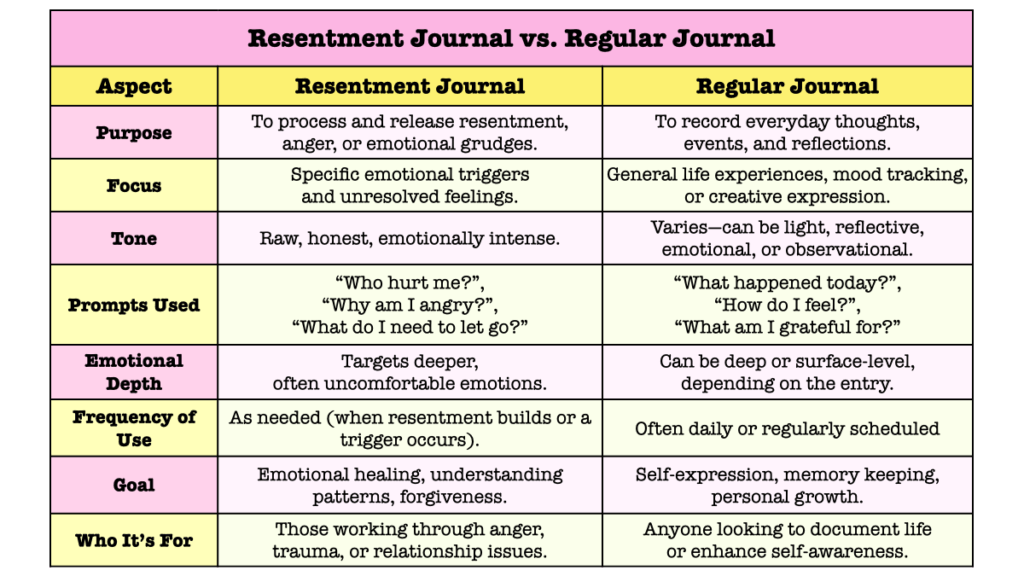
Common Misconceptions About Resentment Journaling
1. A Resentment Journal Makes You Dwell On Negativity
The biggest misconception about a resentment journal is that it makes people dwell on negativity. However, the truth is that resentment journaling is not about focusing on negativity, but rather about acknowledging and processing your negative thoughts. It helps you untangle emotional knots, understand the root of your resentment, and eventually, let it go.
2. Resentment Will Go On Its Own
Some people also believe that if you ignore resentment, it will go away on its own. But that’s not the truth! Ignoring resentment can be harmful and even dangerous. It doesn’t disappear on its own but grows within to come out as mood swings, passive-aggressive behavior, or even burnout. Journaling helps you release resentment in a private and healthy manner.
3. To Do Resentment Journaling, You Have To Be A Good Writer
Another myth about resentment journaling is that you must be a good writer to be good at it. You don’t need to write your resentment journal with correct grammar or any specialized technique. You have to put your thoughts out on a piece of paper to help release your resentment. Sometimes, even simple bullet points help immensely.
4. Accepting Resentment Makes You A Bad Person
Some people also think that accepting their resentment makes them a bad person. This is a misplaced idea. Resentment isn’t a bad emotion, and it doesn’t make you a monster. It’s a normal and coping emotion that needs to be released, which can be done through journaling.
Examples of A Resentment Journal
Example 1: A Personal Relationship Resentment
Date: March 27, 2025
What happened: My friend canceled our plans at the last minute again, for the third time this month.
How I felt: Disappointed and unimportant.
Why it hurt: I value quality time. When someone cancels repeatedly, I feel like an afterthought.
What I’m learning: I tend to overextend myself for people who don’t show up for me. I need boundaries.
What I can do next: I’ll stop initiating plans for now and focus on friendships that feel mutual.
Example 2: A Work-Related Resentment
Date: April 5, 2025
What happened: My manager gave credit for my idea to someone else on the team during the meeting.
How I felt: I felt invisible, undervalued, and angry.
Why it hurt: I worked hard and expected at least a mention. It made me feel like my efforts don’t matter.
What I’m learning: I often suppress my feelings at work to “stay professional.” But it’s okay to speak up for myself respectfully.
What I can do next: I’ll schedule a 1-on-1 with my manager to express how I felt. Not to blame—just to be honest.
This is also one of the best structures for a resentment journal. It’s a simple, concise, and clear way of journaling that can yield the best results.
Types of Resentment Journals
Here are the various possible types of resentment journals you can choose from.
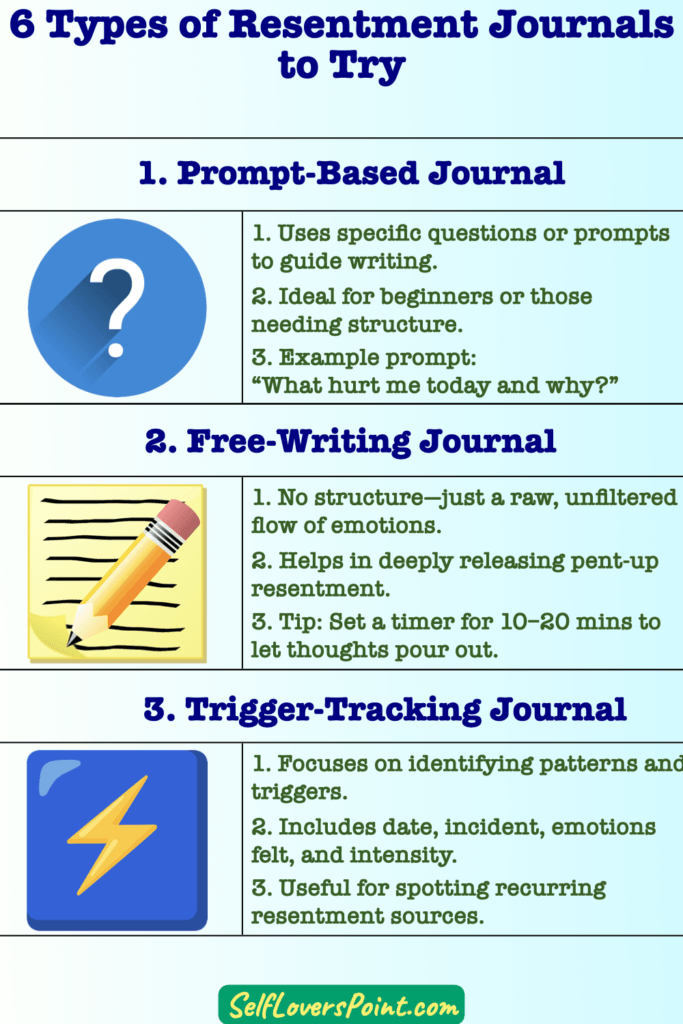
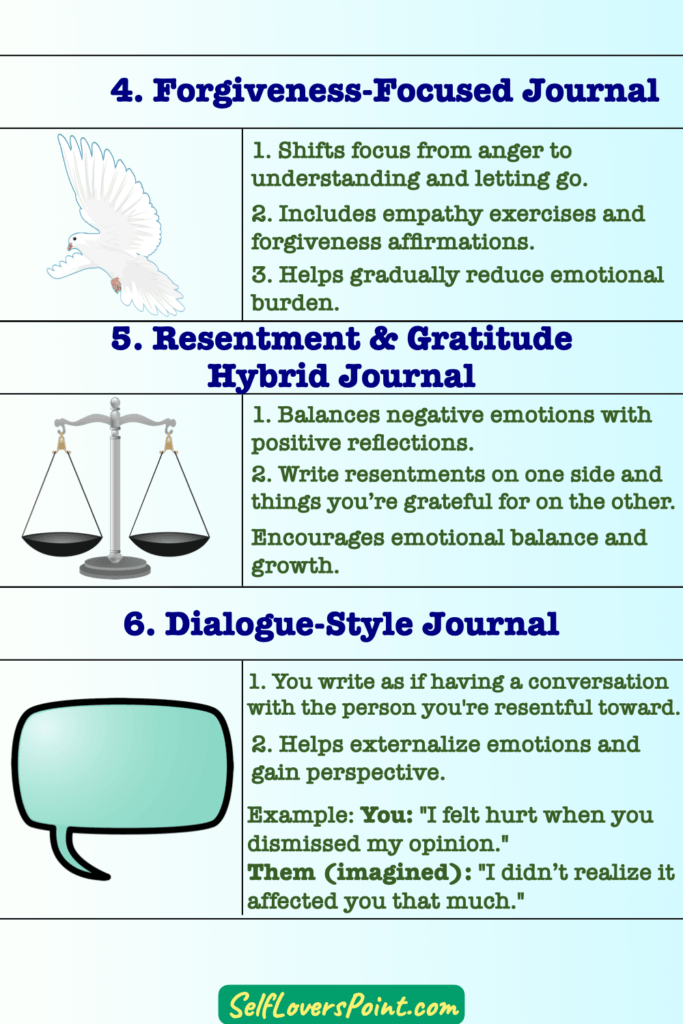
Choose the one that suits you the best and would bring the best results for you.
Signs You Need A Resentment Journal
If you experience any of the following, it’s a sign that you need a resentment journal.
1. Your mind keeps replaying past hurtful or unfair experiences.
2. You feel emotionally weighed down or drained, making every day feel tiring and uninspiring.
3. You get irritated easily and even turn rude over small things.
4. Certain relationships or people repeatedly make you bitter, and you feel stuck with them.
5. You try to let things go, but you still feel hurt deep down.
6. Forgiveness feels hard even when you know it’s the right thing to do.
7. You feel ‘off’ even in everyday situations without knowing why.
Benefits of Keeping A Resentment Journal
Keeping a resentment journal helps you on many fronts. Here are some of the most significant benefits of maintaining a resentment journal.
1. It helps you know what you are genuinely feeling—hurt, anger, disappointment, or all three. Thus, it gives you emotional clarity.
2. It helps you express and not suppress emotions, overcome stress, and improve mental health.
3. It breaks the cycle of rumination over past hurtful events by expressing yourself on paper.
4. It helps you understand emotional patterns and tell what wounds need healing.
5. It helps you understand your past mistakes and draw positive & healthy boundaries for the future.
6. It helps you understand yourself better and lets you respond rather than react to situations.
7. It allows you to forgive people and thus free yourself of the chains of the past.
8. When resentment is released, you gain more control over yourself and re-establish inner peace.
9. When you get over resentment, it lets you communicate effectively, sort things out calmly, and improve relationships.
Meditation is a spiritual activity, whereas journaling about resentment is a physical one. Keeping a resentment journal and meditating are both steps towards the same goal. Both make you calmer, happier, normal, and more natural, improving your mental health. Together, they are more effective, and each has its unique benefits and cannot be compared.
Mindfulness and relaxation exercises are also a kind of meditation. They help immensely in dealing with resentment. They allow you to feel calm and relaxed, which in turn prepares you to do better journaling. They help you effortlessly extract important and reliable emotional information. Thus, mindfulness, relaxation, and journaling about resentment complement each other well.
How To Keep A Resentment Journal
Keeping a resentment journal is a simple yet powerful daily exercise. Here is how to do it.
1. Choose A Format
The first step in maintaining a resentment journal is to choose a format that suits you.
You can choose a notebook/diary or a digital app like Day One or Notion.
Remember that consistency matters more than the method you choose.
2. Set A Regular Time
Select a time that suits you during the day. It is best to choose a time when you feel fresh, as this will help you see things clearly.
Most people prefer to write in their journals before going to bed. This way, you can sum up the day and go to sleep after freeing yourself of all your worries.
Writing 10-15 minutes a day can be enough.
3. Use Simple Prompts
Start each entry with simple prompts like:
What happened?
How did I feel?
Why did it hurt?
How do I heal?
What did I learn from this?
Do I need to let it go or draw positive boundaries?
Asking these simple questions will give instant, clear, and easy answers, making the process effective and enjoyable.
4. Be Honest, Not Diplomatic
Your resentment journal is for you and the general public. So, feel free to pour your heart out without filtering or judging yourself.
Remember, it’s an opportunity to embrace your emotions and not to bury them.
5. Revisit Old Entries Occasionally
Once in a while, you can look at your old entries to notice any pattern or progress.
If certain situations that used to bother you no longer do, this indicates healing and growth.
6. Don’t Force Forgiveness
Do not feel the compulsion to improve or be more forgiving. Instead, go through the motions to understand your emotions, create space, and naturally release the weight of resentment.
7. Keep It Safe & Private
Knowing that your journal is secure and private will help you open up confidently. So, use a password or keep your diary in a safe spot that is out of anyone’s reach.
That’s how you can keep a resentment journal, which lets you heal, progress, and grow continuously.
Remember, it’s not about journaling “right” but showing up honestly for yourself!
Some Other Good Resentment Journal Prompts
Here are some extra prompts to help you uncover specific, deeper resentments.
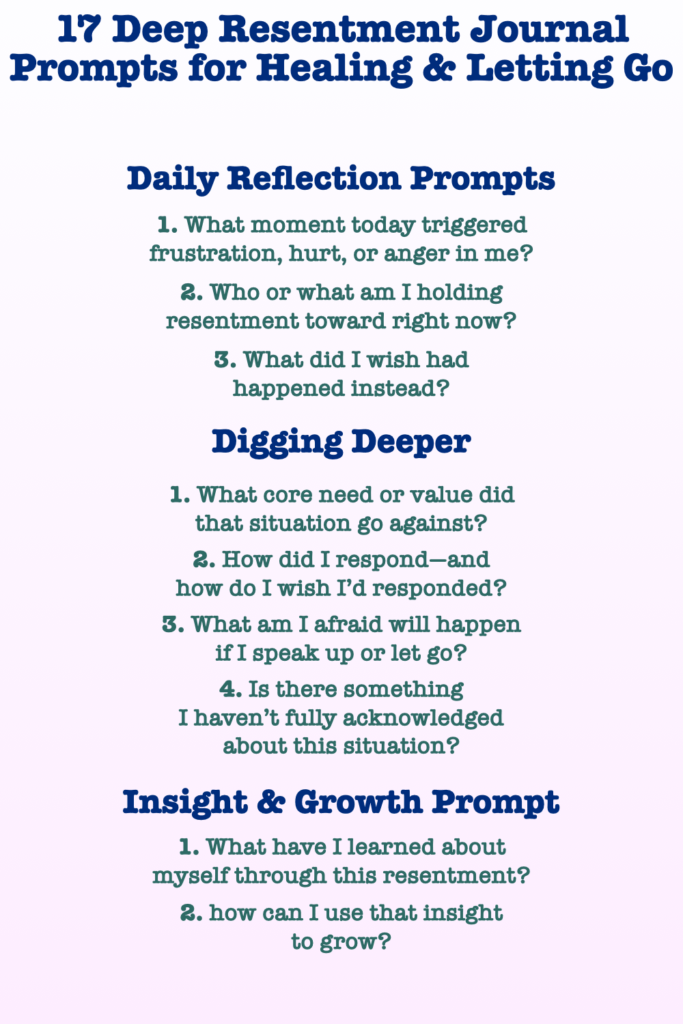

How Often Should We Write In The Resentment Journal?
There is no one-size-fits-all approach. Here is what works best for most people:
1. Start writing in your resentment journal 2-3 times a week.
It will help you ease into the practice without feeling compelled. You will also have enough time to reflect on the events you have written about and consider whether you are on the right path.
2. Pick up the pen when something stings
Whenever you feel a conversation, event, or memory is replaying in your mind, it’s time to journal.
Thus, the resentment journal can be used as a release mechanism when emotions feel bottled up.
3. Consider a weekly review
Keep 10-15 minutes at the end of every week for a resentment journaling review.
Ask yourself the following:
What built up?
What faded?
What did I learn this week about myself?
But the most important thing is not to force it and stay gentle. Some weeks, you will write more, and in other weeks, not so much, and that’s okay!
Challenges In Keeping A Resentment Journal
Although keeping a resentment journal is profoundly beneficial, it’s not always easy to write in it. Here are the challenges you have to face:
1. Difficulty In Facing Emotions
Writing in your resentment journal requires confronting your fears, pain, and inner struggles. This process may, at times, feel overwhelming, especially for a beginner.
You can start small, with a limited number of weekly sessions of shorter duration. Then, move forward according to your suitability and convenience.
2. Falling Into The Rumination Trap
You may feel trapped in overthinking the hurtful past events while journaling or afterward.
To tackle this, always end the entry on a calming and positive note. You can use the prompt – “What do I learn from the experience?” or “What do I need to let go of?”
3. Inconsistency
Finding the time or willingness to journal at the chosen times is daunting.
Do not force yourself to journal. Instead, use incentivization and disincentivization. Ask yourself if you want to overcome your resentment and live a better life.
To make things easier, you can also set a reminder and attach it to a daily habit. For example, you could attach it to your daily reading schedule before going to sleep.
4. Fear of Judgment or Exposure
You may not be able to write carefree, as you fear someone might read it.
To overcome this challenge, keep your journal in a safe place out of others’ reach.
While writing an entry, remind yourself that it’s a safe space.
5. Guilt For Feeling Resentment
When you write about your grudges and unhappiness with people and circumstances, it might feel like you are complaining. You may also think that you have let people down.
Tell yourself that resentment isn’t something unnatural or a crime; it’s normal to have it, and you are not alone.
Also, you are not complaining but freeing yourself of those negative thoughts. Thus, by journaling, you are taking a step toward becoming a better person, which will benefit both you and your loved ones.
When you start maintaining a resentment journal, it may initially seem that your resentment is worsening. It may even feel overwhelming. But that’s because you have acknowledged the underlying issue and have decided to face and overcome it. You had to do it one day. So, a resentment journal might make resentment worse before gradually releasing it.
To ensure your resentment journal helps you move on rather than dwell on the negative emotions, choose the right prompts, especially those with which you end the entry. For example, after analyzing your resentment from a particular incident, end it with prompts like – What did I learn? What can I do to let go of this resentment?
Apart from keeping a resentment journal, you can healthily process resentment by communicating your concerns to the person against whom you hold those grudges. Tell them how you felt about how they treated you. Effective communication can make you feel better, and things may get sorted out.
To release resentment, you should complement journaling and communication with deep breathing exercises, Yoga, and meditation practices.
You can also try innovative measures like writing your resentment on paper and burning it.
Stress-busting activities, such as physical exercise, also help you deal with resentment in a healthy way.
What If The Resentment Journal Doesn’t Help?
Writing is a scientific and time-proven technique to rid yourself of any resentment you may be holding onto. So, if resentment journaling doesn’t help you, you are either being impatient or doing it the wrong way.
Do not expect immediate results; allow some time. Focus on progress rather than results, even if the improvements are minor.
Start small, but be consistent in journaling. Do not avoid or skip it. Additionally, select the appropriate resentment journal prompts. You can use the simple prompts I have listed in this article as they are.
Additionally, do not rely solely on journaling to release your resentment. Complement it with other methods, such as meaningful conversations, deep breathing, Yoga, meditation, and physical exercise.
When you consistently write in your resentment journal, the accumulated resentment within you starts reducing and loses power over you. You start feeling freer, more positive, and thus much better than before. You learn to manage resentment in life daily, which makes you completely resentment-free.
It is when you are ready to start a gratitude or self-love journal to advance your life’s journey.
Who Does A Resentment Journal Help The Most?
Keeping a resentment journal benefits both men and women.
It helps men because men are considered worse at feeling, embracing, and expressing their emotions. Thus, many negative feelings and emotions remain bottled up within them in the absence of any vent or way out. The grudges they hold inside are very unhealthy and dangerous, and a resentment journal can help immensely.
For men, a resentment journal serves as a private emotional gym – quiet yet powerful.
However, women also need to keep a journal of resentment.
Women are supposed to be calm, composed, and nurturing in all situations. This may take a toll on their mental health and cause them to develop a lot of resentment. Maintaining a resentment journal can help women release the tension and start feeling like themselves again.
For women, a resentment journal can serve as a space for emotional honesty and empowerment.
Thus, keeping a resentment journal isn’t about gender; it’s about letting go of the resentment built inside and embracing your true self again.
What personality type does a resentment journal help the most?
A journal of resentment can be beneficial for introverts who are not very social. It can be an introvert’s best friend, with whom they can share their deepest pain points without any risk of judgment or consequences. It’s perfect for introverts because it suits their personality and gives solutions in a private space.
Here are the personality types that most benefit from keeping a resentment journal.
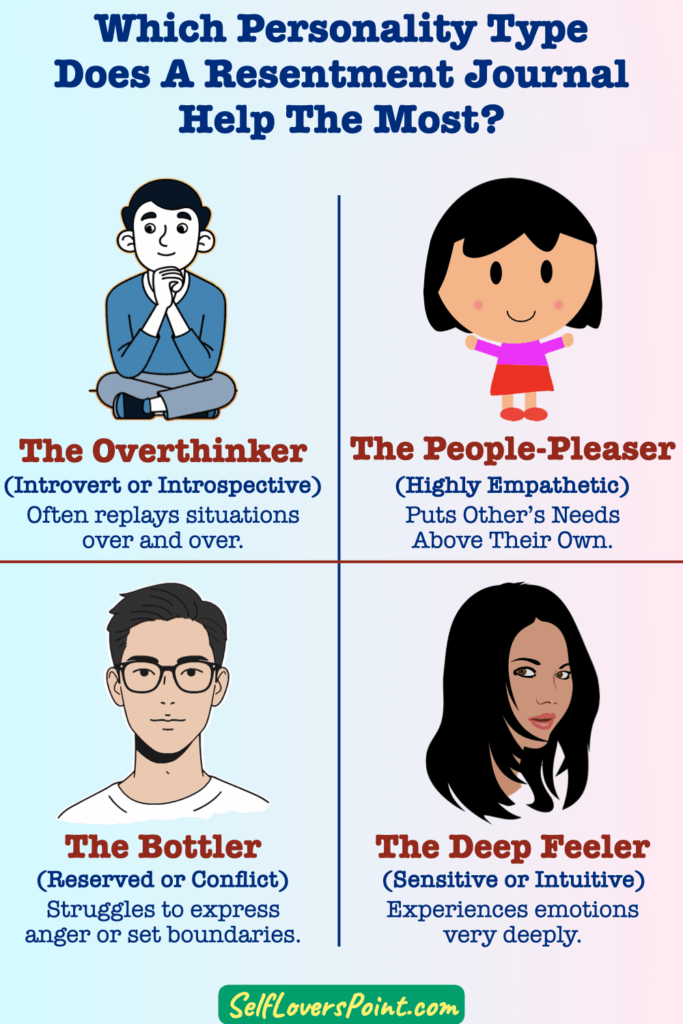
Bring The Enemy Out
I feel it’s way easier to fight an enemy if it’s in front of you rather than when it’s inside you.
When resentment is within you, it will affect your mind and emotions, ultimately changing you in a negative way. But when you bring it out on paper, you release it to fight it and eventually beat it!
Here is a free printable of a resentment journal with some simple and effective journal prompts.
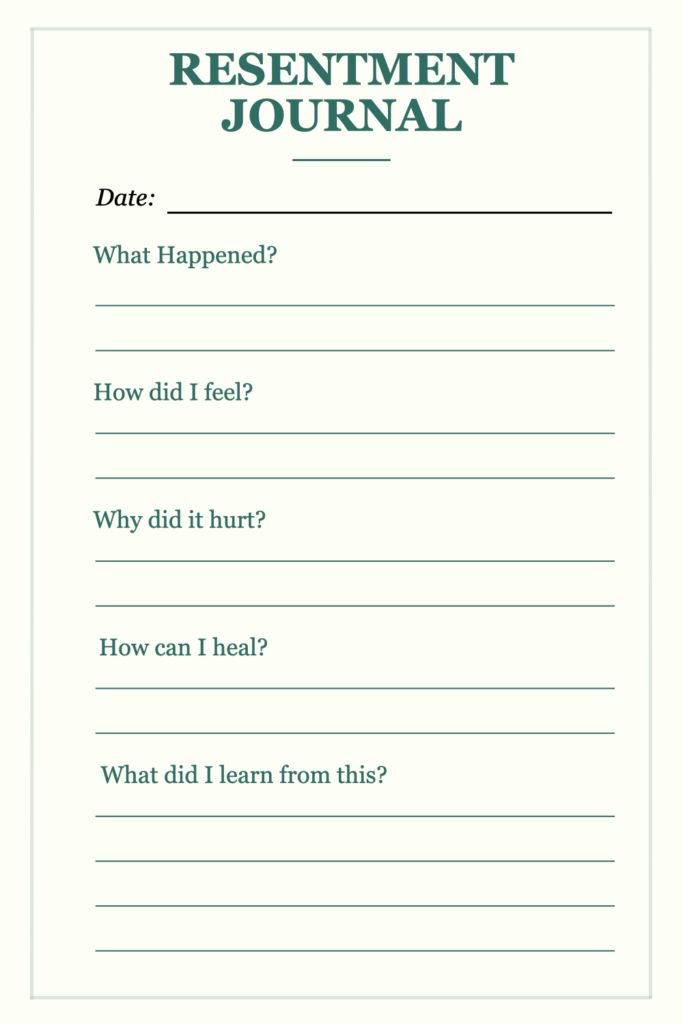
So, when will you start your resentment journal?




